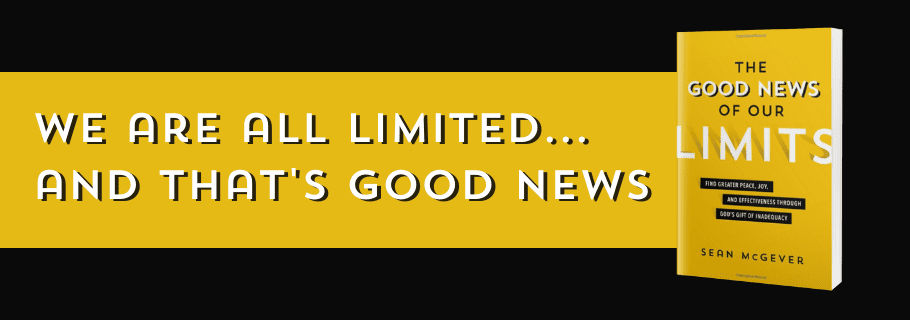Today’s post is written by Sean McGever and is sponsored by Zondervan. Sean is the author of The Good News of Our Limits.
You may believe in a false gospel and not even know it. Worse yet, this message may have come from your favorite Christian books, sermons, and Bible studies. False gospels are nothing new; they are as old as the good news itself.
I wonder, have you believed in the false gospel of omni-productivity? Purveyors of this news sell it to us as an elixir for our desire to do more and be more. I have a response to this message. In The Good News of Our Limits, I show readers how to spot these lies and provide practical ways to embrace our God-given limited design.
The temptation of omni-productivity is nothing new. Our God-given inability is an obvious target for Satan’s schemes. The serpent successfully lured the woman by claiming, “you will be like God” (Gen. 3:5). Woven into the serpent’s temptation is an echo in many of our hearts today. Like the proverbial carrot on a stick in front of a horse, I hear repeatedly, “what if I just could do a little bit more,” or worse, “what if I just could be a little bit more?” Be more? Impossible. Yet, so tempting.
Our depraved nature seeks capacities that belong to God alone. On the first page of Calvin’s Institutes, he writes, “the infinitude of good which resides in God becomes more apparent from our poverty. In particular, the miserable ruin into which the revolt of the first man has plunged us compels us to turn our eyes upwards.” Calvin explains that our failings and shortcomings should alert us to our desperate need for God. Our shortcomings are designed to show us our need to turn heavenward. Yet, countless voices tell us to look inward rather than upward.
We search for solutions using optimization techniques, attempting to fit more and more into our already full days. We try to craft efficiently maximized lives, but these methods always fail, not because they are ill-intentioned, but because they do not go far enough. The Good News of Our Limits provides practical steps for biblical productivity rooted in a theological understanding of our humanity.
The true gospel resides in the earliest confession of the church: Jesus is Lord. Our culture, including our church cultures, surround us with messages to do and be more. This is a false gospel. We cannot be more. All humans are limited in what we can do. Jesus is Lord; I am not. We find greater peace, joy, and effectiveness when we embrace our own inadequacies and delight in the adequacy of our Lord.
Go here to order The Good News of Our Limits or find out more info.

Sean McGever (PhD, University of Aberdeen) is area director for Paradise Valley Arizona Young Life and an adjunct faculty at Grand Canyon University. He speaks, teaches, and ministers across the United States, Canada, and the UK.
What people are saying about The Good News of Our Limits:
“God is God. We are not. He is limitless. We are limited. On the surface, this sounds depressing. But as this book makes clear, this truth is wonderfully freeing as it eradicates the life-sucking pressure to be everything to everyone, everywhere. I’m so glad Sean wrote this book!”
—JORDAN RAYNOR, national bestselling author of Redeeming Your Time, Master of One, and Called to Create
“Sean McGever has been a lifelong bearer of good news. Here, he has done it again, this time proclaiming a refreshing declaration of freedom: ‘It’s okay to be a human being!’ Dietrich Bonhoeffer reminded us that we humans will always be limited in our understanding because we are creations. McGever has developed this idea and expanded it by encouraging us that part of being ‘beautifully and wonderfully made’ (Ps. 139) by the Creator includes our limits. They are a part of the design, not a flaw. ‘It is for freedom that Christ has set us free’ (Gal. 5:1).”
—SCOTT LISEA, campus pastor at Westmont College
“McGever digs into the ‘hustle-pause spectrum’ of our lives, emphasizing the reality of human limitation. According to McGever, our limitations do not pose a threat to kingdom work but are rather a reminder that God is King and we are his image bearers. I found much needed purpose and relief in reading this book.”
—RACHEL JOY WELCHER, editor at Fathom magazine and author of Talking Back to Purity Culture
“The Good News of Our Limits is a refreshing encouragement to embrace how God intentionally designed us as finite human beings. Through relatable stories and illustrations, McGever helps us all discover joy in our inadequacy.”
—DREW HILL, pastor and award-winning author of Alongside: Loving Teenagers with the Gospel
Go here to order The Good News of Our Limits or find out more info.









